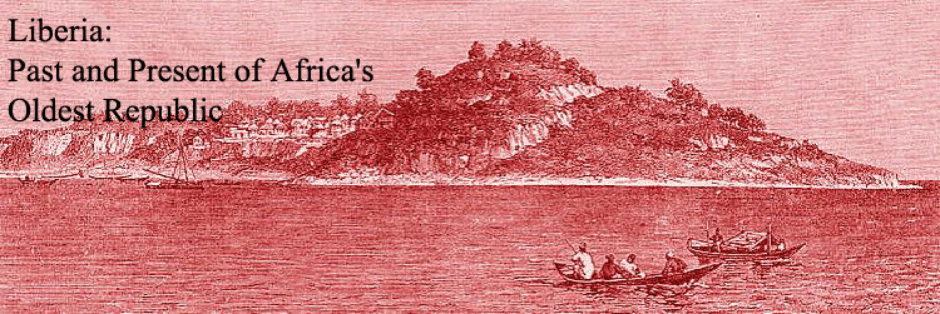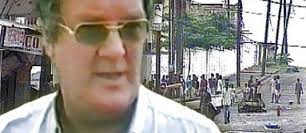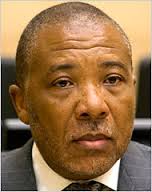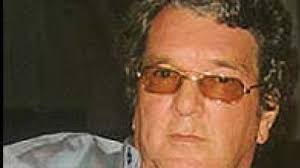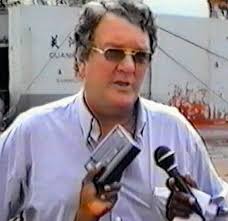 Yesterday, I was pleasantly surprised when learning the news that the Kouwenhoven trial had reopened – on February 6. Already on more than one occasion I wrote about the serious charges against Guus Kouwenhoven, a Dutch businessman. Guus Kouwenhoven – in Liberia known as ‘Mr Gus’ – is accused of illegal arms trading and of war crimes during the civil war in Liberia. See my March 10 & March 20 (2008) and April 20, 2010 postings on this blog.
Yesterday, I was pleasantly surprised when learning the news that the Kouwenhoven trial had reopened – on February 6. Already on more than one occasion I wrote about the serious charges against Guus Kouwenhoven, a Dutch businessman. Guus Kouwenhoven – in Liberia known as ‘Mr Gus’ – is accused of illegal arms trading and of war crimes during the civil war in Liberia. See my March 10 & March 20 (2008) and April 20, 2010 postings on this blog.
For those readers who haven’t heard about the Kouwenhoven trial before and for those who have forgotten what it’s all about, here’s an overview of the Kouwenhoven case. I’ll first describe who he is and what he did in Liberia after his arrival in the late 1980s, notably his dealings with Charles Taylor. Then I’ll tell more about his arrest in the Netherlands in 2005 and subsequent court rulings. I conclude with the planning of his reopened trial.
Guus Kouwenhoven
According to a BBC profile, Guus Kouwenhoven started his career in Lebanon and the United States in the 1970s. His stay in the US ended abruptly when he was arrested in Los Angeles after trying to sell stolen pantings, including a Rembrandt. He was lucky though and was not sentenced to many years in prison but was deported. In the late 1980s he emerged in Liberia where he imported BMW cars and became manager of the luxurious Africa Hotel, constructed by the slain President Tolbert for the OAU conference hosted by Liberia in 1979.

‘Mr. Gus’ engaged in the lucrative timber trade. Liberia is, as we know, one of the few countries still largely covered with pristine primary forest, full of valuable tropical hardwood. In the Netherlands, Guus Kouwenhoven was in the Quote 500 list of the richest people in the country. From 1999 to 2003 Guus Kouwenhoven was the most important foreign timber trader in Liberia. He was chairman of the Oriental Timber Company (OTC), a Malasian company with obscure owners, and managing director of the Royal Timber Corporation (RTC). Guus Kouwenhoven and then president Charles Taylor had close relations, personal as well as financial (via OTC and RTC). Charles Taylor was to receive 50% of Kouwenhoven’s royalties ‘earned’ in OTC whereas 50% of the shares in RTC were owned by warlord-turned-president Charles Taylor. In exchange, Taylor granted large concession areas for logging purposes. Charles Taylor also gave the management of the port of Buchanan to OTC. It is important to underline that this made OTC responsible for the security in the port area and included the checking of all cars (and trucks!) coming in and going out.
The accusations
In 2000, the UN’s Expert Panel report on Sierra Leone – rightfully – claimed that Guus Kouwenhoven was part of Charles Taylor’s inner circle and was allegedly closely involved in arms smuggling (through the port of Buchanan). He was subsequently issued with a UN travel ban although, according to a UN report, like many others on the list, he more or less ignored the ban and simply used a Liberian diplomatic passport. Later, the UN ordered international banks to freeze his assets. That seemed to have little effect either. ‘Mr. Gus’ continued to travel in and out of Liberia, and to and from Europe.
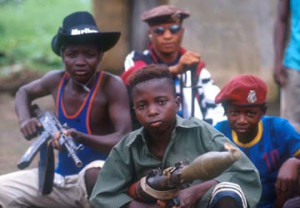 In its final report of 2009, the Liberian Truth and Reconciliation Commission (TRC) stated that OTC transferred US$ 7.9 million directly to Charles Taylor’s bank account, and US$ 13.4 million to unknown bank accounts, including US$ 1.9 million to unknown arm traffickers. Acording to the TRC report, OTC paid for and organized numerous weapons deliveries to Liberian militias and the RUF regime in Sierra leone, through the port of Buchanan. Moreover, the TRC report alleged that OTC’s armed security service committed gross violations of human rights and that these ‘security forces’ could hardly be distinguished from regular NPFL fighters, Charles Taylor’s militia. The report also accused Guus Kouwenhoven of an impressive series of economic crimes: violations of forestry regulations, illegal logging, tax evasion, bribery and corruption.
In its final report of 2009, the Liberian Truth and Reconciliation Commission (TRC) stated that OTC transferred US$ 7.9 million directly to Charles Taylor’s bank account, and US$ 13.4 million to unknown bank accounts, including US$ 1.9 million to unknown arm traffickers. Acording to the TRC report, OTC paid for and organized numerous weapons deliveries to Liberian militias and the RUF regime in Sierra leone, through the port of Buchanan. Moreover, the TRC report alleged that OTC’s armed security service committed gross violations of human rights and that these ‘security forces’ could hardly be distinguished from regular NPFL fighters, Charles Taylor’s militia. The report also accused Guus Kouwenhoven of an impressive series of economic crimes: violations of forestry regulations, illegal logging, tax evasion, bribery and corruption.
Kouwenhoven arrested and on trial
On March 18, 2005, then 62-year old ‘Mr Gus’ was arrested in Rotterdam, the Netherlands. He was accused of illegal arms deliveries to Charles Taylor between 2000 and 2002, despite the UN arms embargo imposed on Liberia, and of involvement in human rights violations and war crimes committed by warring factions in Liberia and Guinea between July 2001 and May 2003.
His trial in the District Court of The Hague started on April 24, 2006. Six weeks later, on June 7, 2006 , the District Court sentenced him to eight years in prison – the Public Prosecutor had requested 20 years imprisonment – for supplying arms to Charles Taylor illegally, and breaching the UN arms embargo against Liberia. He was acquitted of the charge of participating in war crimes. Both the Defense and the Prosecution appealed. Kouwenhoven was released from prison pending a new trial (March 2007).
A year later, on March 12, 2008, the Court of Appeal in The Hague overturned the 2006 conviction and acquitted Guus Kouwenhoven of all charges. The judges severely criticized the Public Prosecutor, calling the witnesses too unreliable to give valid evidence. The Public Prosecutor disagreed and lodged an appeal against the verdict at the Dutch Supreme Court. One of the reasons for the appeal was the fact that two anonymous witnesses had not been allowed to testify. The Public Prosecutor argued that the decision to turn down the request to hear the two witnesses (referred to as ‘03’ and ‘04′ – real names are withheld by the court for security and privacy reasons) was not sufficiently motivated.
On April 20, 2010, the Supreme Court delivered its decision and quashed the Appeal Court’s decision. The Supreme Court found that the decision by the Hague Court of Appeal to not hear two anonymous witnesses was insufficiently motivated. The Supreme Court declared the decision of the Hague Appeal Court null and void, and sent the case back to the Appeal Court of s’-Hertogenbosch.
The reopening of the trial – February 6, 2017
The foregoing is important. The 2008 acquittal by the Hague Court of Appeal has been declared null and void by the Supreme Court. This means that the 2006 conviction of Guus Kouwenhoven is still valid. It depends on the outcome of the present trial at the Appeal Court in s’-Hertogenbosch whether Kouwenhoven will spend the coming six years in jail (his sentence, eight years imprisonment, minus his pre-trial detention).
The Public Prosecutor has been working on this case since 2010. Many witnesses have again been heard during the past six years, in Liberia, in the US, even in Hong Kong. Charles Taylor, who purges a 50 year jail sentence in a maximum security jail in the UK, when requested to testify, refused (2016). Witness 03 could no longer be traced, witness 04 could not be contacted. On the first day of the reopened trial, on February 6, Kouwenhoven’s lawyer, Inez Weski, requested that more witnesses be heard, but the court found her request unreasonable and saw no reason to delay the trial any longer. All requests Weski submitted were declined by the court.
Guus Kouwenhoven, now 74-year old, was not present at the reopening of his trial, ‘for medical reasons’. It is interesting to note that the court asked his lawyer about the defendant’s health, and whether he was ‘fit for jail’. Weski did not answer, but promised to come back at this issue during her plea, scheduled for February 24.
Next Friday, on February 10, the Public Prosecutor will present his requisitory. Will it uphold the 2006 conviction and sentence? Subsequent court sessions are planned on February 24 (‘plea’), March 10 (‘reply’) and March 17 (‘rejoinder’). On the latter date, the court will announce the date it will render its verdict.
Many years have passed since the crimes were committed. Liberia and Liberians still struggle to come at grips with the country’s ugly past of rape, murder, torture, human rights violations and … impunity. Warlords still walk free in Monrovia and other cities in Liberia, national reconciliation is a far-away goal. Meanwhile the victims of the two civil wars that ravaged the country have been betrayed. The country’s present Administration has failed to address their problems. Political leaders nowadays are as greedy as those who led the country to a civil war when anarchy prevailed and justice was denied. I am proud of my country’s judicial system. It plays an exemplary role and I am sure that the world is watching the outcome of this trial, notably people in Liberia. It is extremely difficult to investigate what happened in Liberia during the civil crisis but the Dutch judges and public prosecutors did a tremendous job. The research and investigation between 2010 and 2017 have been hampered by all sort of difficulties, not least by the Ebola epidemic in West Africa, in particular in Liberia, Guina and Siera Leone, during 2014 and 2015. Needless to say, I can hardly wait till the final verdict in the Kouwenhoven case.
To be continued.
Sources
The contribution presented above has been largely based on the author’s 2015 book ‘Liberia: From The Love of Liberty to Paradise Lost’ and on the Dutch-language sources mentioned below and published by the Dutch Public Prosecution Service:
- ‘Liberia: From The Love of Liberty to Paradise Lost’ by Fred van der Kraaij (ASC Leiden, 2015), pp. 76-78. The book is available online (free access): https://openaccess.leidenuniv.nl/handle/1887/33835
- Truth and Reconciliation Commission, Final Report, Volume II: Consolidated Final Report (Republic of Liberia, 2009), p. 337. Available online: http://trcofliberia.org/reports/final-report
- ‘Guus Kouwenhoven’ (The Hague Justice Portal), accessed on February 8, 2017: http://www.haguejusticeportal.net/index.php?id=6412
- ‘Guus K. – Hoger beroep. Strafzaak van (oud-)zakenman verdacht van betrokkenheid bij illegale wapentransacties aan het regime van Charles Taylor in Liberia’, accessed on February 8, 2017: https://www.rechtspraak.nl/Uitspraken-en-nieuws/Bekende-rechtszaken/Guus-K
- Uitspraak Rechtbank ’s-Gravenhage, datum uitspraak: 07-06-2006; datum publicatie 07-06-2006; zaaknummer: 09/750001-05; accessed on February 8, 2017: http://deeplink.rechtspraak.nl/uitspraak?id=ECLI:NL:RBSGR:2006:AX7098
- ‘Liberia’ (Openbaar Ministerie), accessed on February 8, 2017: https://www.om.nl/onderwerpen/kopie-international/rechtszaken-per-land/liberia/
